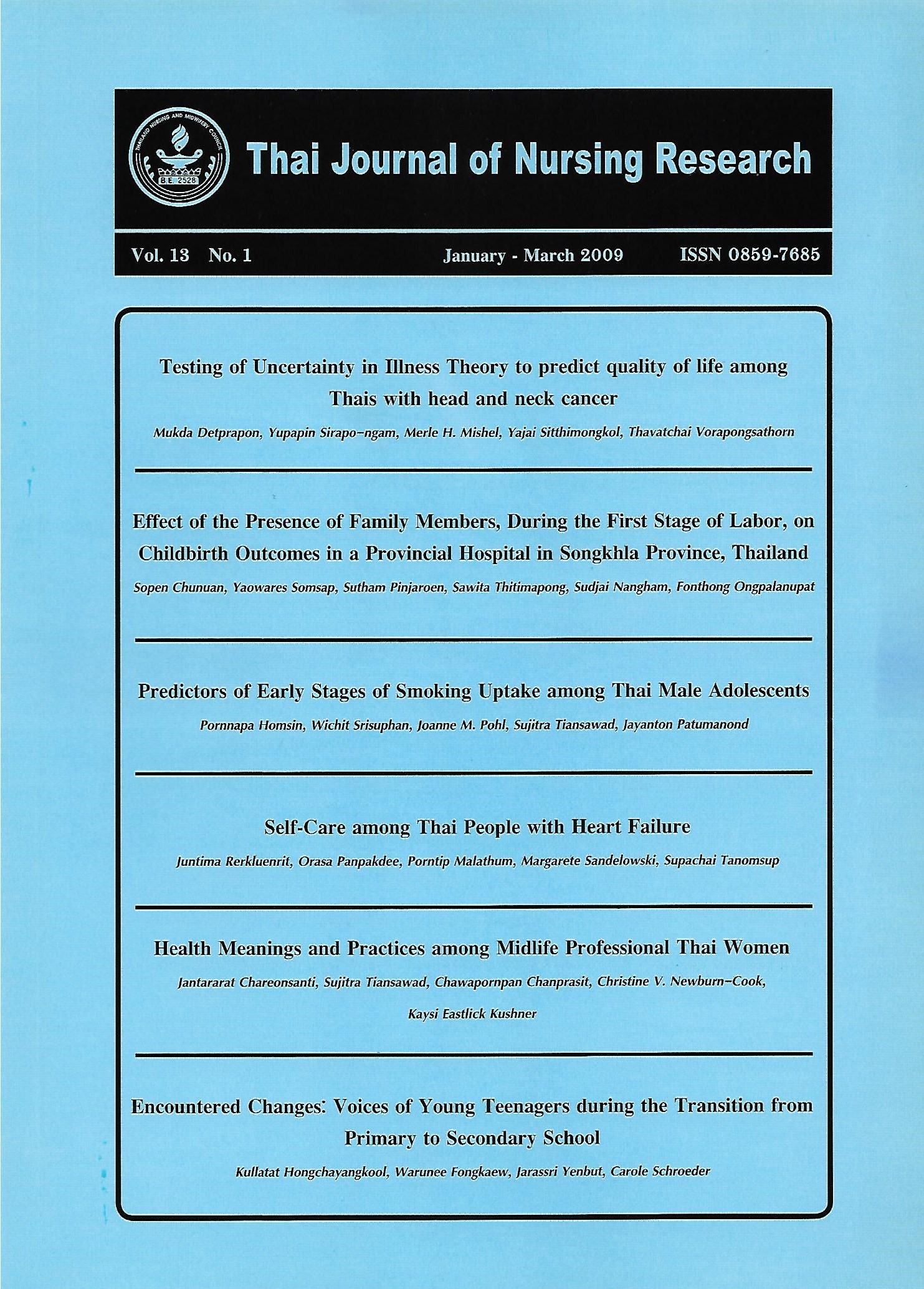Self - Care among Thai People with Heart Failure
Keywords:
การจัดการดูแลตนเอง, คนไทย, ภาวะหัวใจวาย, การสร้างทฤษฎีจากข้อมูลพื้นฐาน (Grounded theory), self-care management, Thais, heart failure, grounded theoryAbstract
บทคัดย่อ
การวิจัยเชิงคุณภาพแบบการสร้างทฤษฎีจากข้อมูลพื้นฐาน(Grounded theory) ครั้งนี้มี วัตถุประสงค์เพื่อศึกษากระบวนการจัดการดูแลตนเองของคนไทยที่มีภาวะหัวใจวาย ข้อมูลหลักได้จากการสัมภาษณ์เชิงเจาะลึกจากผู้ที่มีภาวะหัวใจวาย จำนวน 35 คน และวิเคราะหัข้อมูลเซิงเปรียบเทียบข้อมูลร่วมกับกระบวนการให้รหัส
ผลการศึกษาพบว่าการดูแลตนเองของผู้ที่มีภาวะหัวใจวายเป็น “กระบวนการจัดการดูแลตนเอง เพื่อการมีชีวิตอยู่ในภาวะหัวใจวาย” โดยแบ่งออกเป็น 3 ระยะคือ ระยะที่ 1 “ระยะก่อนมีภาวะหัวใจวาย” ในระยะนี้ผู้ที่มีภาวะหัวใจวายไม่ทราบว่าโรคที่ตนเองเป็นนั้นสามารถนำไปสู่ภาวะหัวใจวายได้ จึงเข้ารับ การรักษาไม่สม่ำเสมอและลองใช้วิธีการรักษาที่หลากหลายทั้งการรักษาแบบพื้นบ้านและการรักษาแผนปัจจุบัน จนยอมรับว่าตนเองมีภาวะหัวใจวาย ในระยะที่ 2 “ระยะมีภาวะหัวใจวาย” ในระยะนี้ผู้ที่มีภาวะหัวใจวายปรับเปลี่ยนวิถีชีวิตของตนเองใหม่เพื่อให้สอดคล้องกับแผนการรักษาอย่างเคร่งครัด แต่รู้สึกว่าความมีคุณค่าของตนเองลดลงเนื่องจากต้องคอยพึ่งพาผู้อื่นอย่างไรก็ตามผู้ที่มีภาวะหัวใจวายได้ตระหนัก ถึงแรงสนับสนุนจากครอบครัวและเพื่อน จึงทำให้มีกำลังใจในการดูแลตนเอง ในระยะที่ 3 “ระยะของการมีชีวิตอยู่อย่างปกติในภาวะหัวใจวาย” เป็นระยะที่เกี่ยวข้องกับการควบคุมภาวะหัวใจวายและการสร้างเสรีมความมีคุณค่าของตนเองเพื่อการมีชีวิตอยู่ร่วมกับภาวะหัวใจวาย ผู้ที่มีภาวะหัวใจวายปรับแผนการรักษาให้เหมาะสมกับวิถีชีวิตของตนเอง โดยมีลักษณะส่วนบุคคล ลักษณะทางคลินิก และความเชื่อเป็นทั้งสิ่งที่สนับสนุนหรือเป็นอุปสรรคในการดูแลตนเองในแต่ละระยะ
ผลการศึกษาครั้งนี้ชี้ให้เห็นกระบวนการจัดการดูแลตนเองของผู้ทีมภาวะหัวใจวายในแต่ละระยะเพื่อเป็นข้อมูลพื้นฐานให้แก่แพทย์และพยาบาลเข้าใจและวางแผนการดูแลทั้งต้านการป้องกันภาวะแทรกซ้อน และการจัดการกับอาการในแต่ละระยะ เพื่อส่งเสรีมคุณภาพชีวิตของผู้ที่มีภาวะหัวใจวายให้ดีขึ้นตาม ศักยภาพ
คำสำคัญ: การจัดการดูแลตนเอง คนไทย ภาวะหัวใจวาย การสร้างทฤษฎีจากข้อมูลพื้นฐาน (Grounded theory)
Abstract
This grounded theory study aimed to explore self-care management among Thai people with heart failure. The participants were 35 Thais with heart failure. In-depth interviews were the method of data collection. Constant comparison and a coding process were the basic analysis methods.
The study findings shed light on “the process of self-care management to live with heart failure.”
This process consisted of three phases, including: Phase 1- Before becoming a person with heart failure; Phase 2 - Becoming a person with heart failure; and, Phase 3 - Living with heart failure.
เท Phase 1, the participants perceived they had an underlying disease, but lacked an awareness of the consequences of having the disease. Thus, they abandoned adhering to the medical treatment regimens when they no longer experienced symptoms. Moreover, they sought assistance both from complementary therapies and modern medical treatments. Finally, each accepted that s/he became a person with heart failure. เท Phase 2, the participants adjusted their lifestyles so as to strictly follow the medical treatment regimens. They became dependent on others, which made their self-worth decrease. However, support from family and friends encouraged them to live with heart failure, and they then moved to Phase 3. เท the last phase, the participants adjusted the medical treatment regimens to suit their lives and found out how they could reconstruct their self-worth.
The findings offer a new insight into the process of self-care management among Thais with heart failure, which can be used as basic information to: (a) develop a specific intervention program for people with heart failure; and, (b) motivate patients to engage in effective self-care.
Key words: self-care management, Thais, heart failure, grounded theory
Downloads
How to Cite
Issue
Section
License
Copyright: The Pacific Rim International Journal of Nursing Research, Thailand Nursing & Midwifery Council has exclusive rights to publish, reproduce and distribute the manuscript and all contents therein.








.png)



